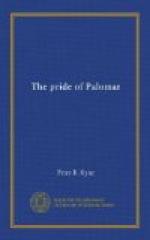William halted the car in the schoolhouse yard and Farrel got out and walked to the schoolhouse door. An American school-teacher, a girl of perhaps twenty, came to the door and met him with an inquiring look. “May we come in?” Farrel pleaded. “I have some Eastern people with me and I wanted to show them the sort of Americans you are hired to teach.”
She smiled ruefully. “I am just about to let them out for recess,” she replied. “Your friends may remain in their car and draw their own conclusions.”
“Thank you.” Don Mike returned to the car. “They’re coming out for recess,” he confided. “Future American citizens and citizenesses. Count ’em.”
Thirty-two little Japanese boys and girls, three Mexican or Indian children and four of undoubted white parentage trooped out into the yard and gathered around the car, gazing curiously. The school-teacher bade them run away and play and, in her role of hostess, approached the car. “I am Miss Owens,” she announced, “and I teach this school because I have to earn a living. It is scarcely a task over which one can enthuse, although I must admit that Japanese children are not unintelligent and their parents dress them nicely and keep them clean.”
“I suppose, Miss Owens,” Farrel prompted her, having introduced himself and the Parkers, “that you have to contend with the native Japanese schools.”
She pointed to a brown house half a mile away. Over it flew the flag of Japan. “They learn ancestor worship and how to kow-tow to the Emperor’s picture down there, after they have attended school here,” she volunteered. “Poor little tots! Their heads must ache with the amount of instruction they receive. After they have learned here that Columbus discovered America on October 12th, 1492, they proceed to that Japanese school and are taught that the Mikado is a divinity and a direct descendant of the Sun God. And I suppose, also, they are taught that it is a fine, clean, manly thing to pack little, green, or decayed strawberries at the bottom of a crate with nice big ones on top—in defiance of a state law. Our weights and measures law and a few others are very onerous to our people in La Questa.”
“Do you mean to tell me, Miss Owens,” Parker asked, “that you despair of educating these little Japanese children to be useful American citizens?”
“I do. The Buddhist school over yonder is teaching them to be Japanese citizens; under Japanese law all Japanese remain Japanese citizens at heart, even if they do occasionally vote here. The discipline of my school is very lax,” she continued. “It would be, of course, in view of the total lack of parental support. In that other school, however, the discipline is excellent.”
She continued to discourse with them, giving them an intimate picture of life in this little Japan and interesting revelations upon the point of view, family life and business ethics of the parents of her pupils, until it was time to “take up” school again, when she reluctantly returned to her poorly paid and unappreciated efforts.




